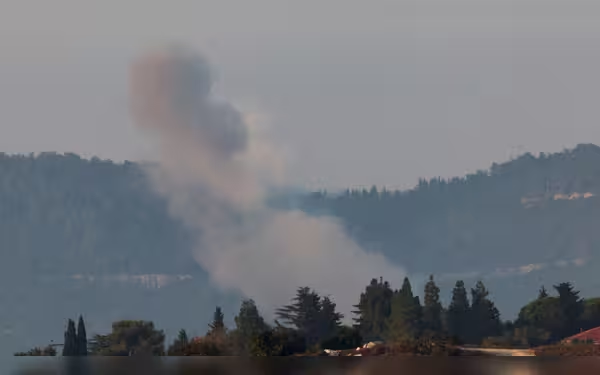Thursday, November 7, 2024 01:11 PM
Missile Strike Injures Dozens in Central Israel Amid Escalating Conflict
- Missile strike from Lebanon injures over a dozen in Israel.
- WHO reports injuries at Gaza polio vaccination center.
- Israeli naval commandos capture senior Hezbollah operative.
 Image Credits: france24
Image Credits: france24A missile strike from Lebanon injures dozens in Israel, escalating tensions amid ongoing conflict and humanitarian concerns.
In recent days, the ongoing conflict between Israel and Hezbollah has escalated dramatically, leading to significant casualties and heightened tensions in the region. A missile strike from Lebanon has injured over a dozen individuals in central Israel, marking a troubling development in the already volatile situation. The Lebanese health ministry reported that at least one person was killed and 15 others injured due to an Israeli air strike that targeted a southern suburb of Beirut. This attack occurred without the usual prior warning for evacuation, raising concerns about the conduct of military operations in densely populated areas.
On the same day, the World Health Organization (WHO) reported that six people, including four children, were injured in a strike on a polio vaccination center in northern Gaza. WHO chief Tedros Adhanom Ghebreyesus expressed his dismay, stating, "The Sheikh Radwan primary health care center in northern Gaza was struck today while parents were bringing their children to the life-saving polio vaccination in an area where a humanitarian pause was agreed to allow vaccination to proceed." This incident highlights the dire consequences of military actions on essential health services, particularly for vulnerable populations.
In a related development, Israeli naval commandos captured a "senior Hezbollah operative" in the Lebanese coastal city of Batroun. This operation has been described as the first of its kind since the onset of the war between Israel and Hezbollah. The Lebanese military confirmed that a civilian was abducted during this operation, although details regarding the individual’s identity remain undisclosed. The Israeli military has stated that the captured operative is an expert in his field and is currently being investigated.
As tensions continue to rise, Israel has raised the alert level in the Lower Galilee and southern Golan regions from "partial" to "full." This decision reflects the ongoing hostilities with Hezbollah, which has been exchanging fire with Israeli forces since October 2023. In response to the escalating situation, Israel has also eased restrictions on public gatherings, allowing up to 2,000 people to assemble in certain communities.
Meanwhile, diplomatic efforts are underway in Cairo, where meetings between Fatah and Hamas are being held to discuss the formation of a committee to govern Gaza in the aftermath of the conflict. A senior Egyptian security source indicated that Hamas is pushing for a comprehensive agreement that would not only end the war but also facilitate a hostages-for-prisoners swap deal. However, Israeli Prime Minister Binyamin Netanyahu has maintained that the war will only conclude once Hamas is completely eradicated.
In a concerning turn of events, the UN refugee chief reported that an Israeli air strike hit humanitarian structures at a border crossing between Lebanon and Syria. This crossing, known as Jousieh, has become a critical escape route for those fleeing the Israel-Hezbollah war. The recent air strike has further complicated the already challenging situation for civilians seeking safety.
As the conflict continues to unfold, the humanitarian impact is becoming increasingly severe. The strikes on health facilities and civilian infrastructure underscore the urgent need for a ceasefire and a renewed focus on humanitarian aid. The international community must prioritize the protection of civilians and work towards a peaceful resolution to this ongoing crisis. The situation remains fluid, and it is crucial for all parties involved to engage in dialogue to prevent further loss of life and suffering.













